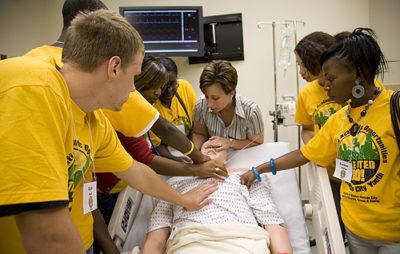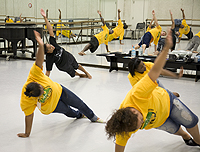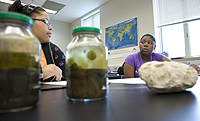UMKC students encourage teens to consider a higher education
Benita Jones knows what it’s like to go to an inner-city high school where academic excellence and encouraging mentors are sometimes few and far between. She also knows how much of a difference one mentor can make.
That’s why the junior Studio Art and Art Education major decided to mentor students through the University of Missouri-Kansas City’s Talented 30! program. Designed to support low-income Kansas City-area youth who have been historically underrepresented in higher education, the free program focuses on leadership development, educational opportunity and access and goal-setting. The United Services Community Action Agency supplied a one-year grant for UMKC to create the program.
In the summer of 2009, the program invited 30 area high school students to UMKC. Before joining Talented 30!, the students had participated in P.A.V.E. the Way (Project Assets and Values in Education) — another United Services Community Action Agency program that encourages low-income high school students to reach beyond their current circumstances.
The Talented 30! program began with a campus tour and featured modules on leadership development, positive attitudes, social justice, environmental justice, financial aid, writing, dance and healthcare. Throughout the three-week program, students developed their own style of leadership through a social justice lens by focusing on the teachings of Rev. Dr. Martin Luther King, Jr., Malcolm X, Ida B. Wells and Cornel West.
While UMKC faculty led educational modules, undergraduate and graduate students with leadership and social justice experience volunteered as program mentors. The mentors talked with students about goal-setting, their paths to UMKC and college life.
“I always excelled in school and I was involved in almost every extracurricular activity, but the idea of college wasn’t for me,” said Jones. “But with my mentor and my motivational parents, I decided to pursue a higher education. There are so many children out there who lack the confidence they need to push them to success, so as a mentor I help build it.”
Ashley Burress, a third-year Pharmacy student, volunteered for the program because she wanted to encourage high school students from the urban core to pursue a higher education. Since the program began two weeks ago, Burress said she has seen tremendous changes in the students.
“They’re more positive, and they’re paying more attention now,” said Burress. “Many had asked questions in regard to college, and they think it’s amazing to see college programs. I hope this experience lets them know there’s always something better, and that they can become who they want to be.”
Like Burress, Jones said she’s seen major changes in the high school students.
“They want to participate more than they did last week,” Jones said. “This is bringing out the best in them. I hope they always have positive mentors.”
In line with the program’s social justice mission, the Department of Geosciences provided environmental science activities with an environmental justice component. Students engaged in water, soil and air quality experiments and learned about new careers in urban environmentalism that could enhance a community’s long-term health outlook. For example, participants discussed the disproportionate allocation of waste in low-income neighborhoods and the effects of those pollutants on individual and community health. They also discussed practical ways for students to improve their communities.
Because these students have grown up in low-income neighborhoods, they will add important insights into social justice discussions, said Kristi Ryujin, Director of Diversity Initiatives for the UMKC Division of Diversity, Access & Equity.
“They might be more passionate about it, if they’ve had to go through muck and mire every day,” Ryujin said. “They might have creative ideas to avoid getting ill, and this will indeed enhance the intellectual and academic experience of all students and faculty. It makes for a better university.”
Despite the program’s serious purpose, students still had fun.
The School of Nursing simulation lab’s robotic “patients” provided one such opportunity. After explaining how a robotic pregnant “patient” reacts to medication and produces blood and urine, the instructor explained that she could speak through a machine to simulate the patient speaking.
“Make her throw up!” one of the students said.
Not to disappoint, the instructor made a groaning sound and the students erupted into laughter.
Keitha Boston, a senior Ruskin High School student, thought the program was a fun way to spend the summer.
“It was fun to meet new people instead of sitting at home,” said Boston, who is starting to consider a higher education. “I enjoyed learning ballet and writing because I got to express my own ideas.”



